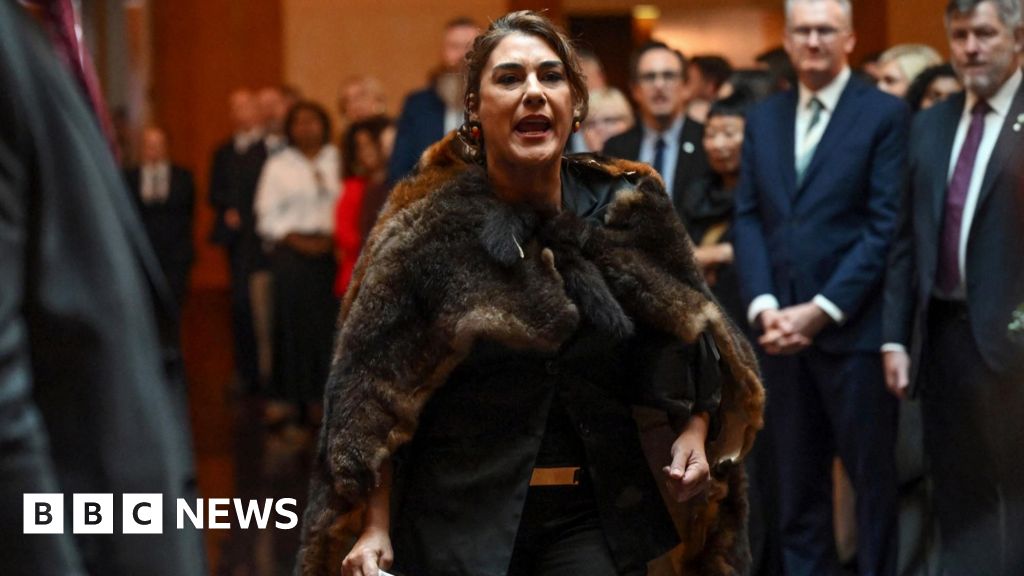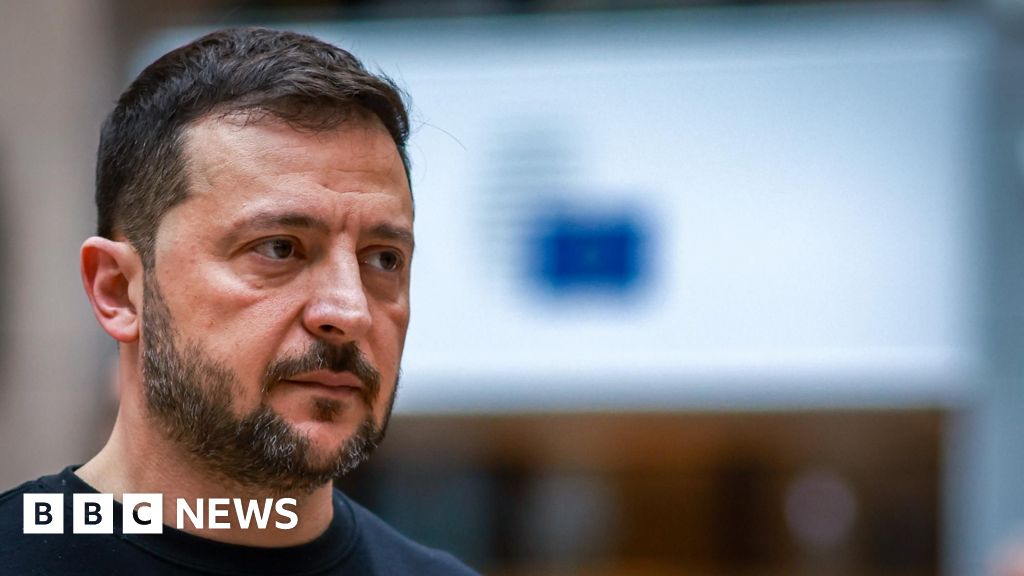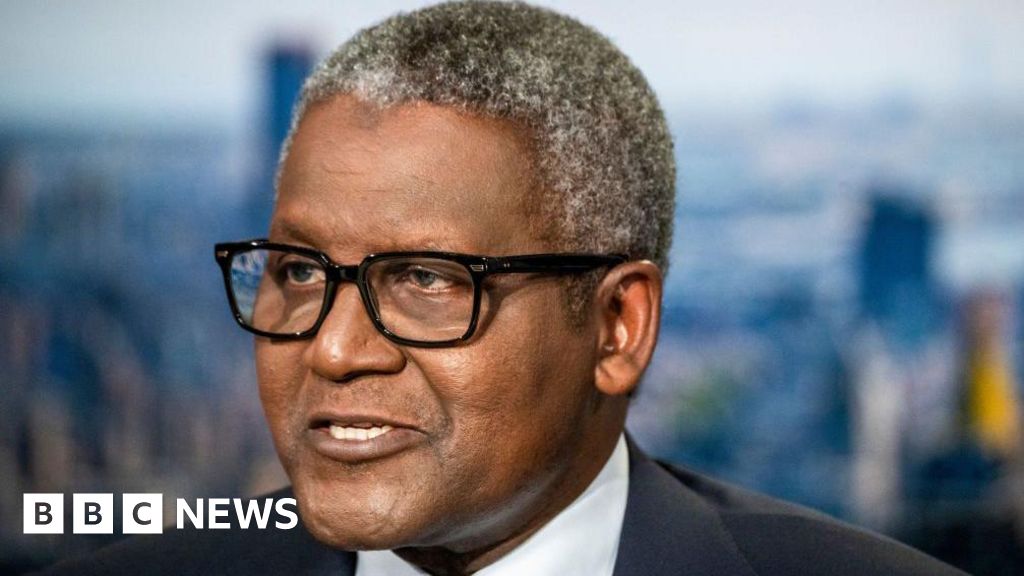ARTICLE AD BOX
By Nick Beake
BBC News Europe correspondent
The Chinese-built Pelješac Bridge in Croatia
Billions of dollars of Chinese money are boosting some European economies - but some of the deals being struck have a catch. Critics say they are "debt traps", where China gets to choose what happens if loans aren't repaid.
China insists it is a reliable investment partner - but it is also facing allegations of worker exploitation and environmental damage.
It is one of those CCTV moments where a disaster is about to happen. A dock worker at the vast Greek port of Piraeus, near Athens, can be seen strolling along the quayside next to a huge stack of shipping containers.
Suddenly, he looks up to see one of them plummeting towards him, with another close behind. The docker sprints away and narrowly escapes being crushed by the two huge boxes - which instead smack down hard on an empty lorry.
Watch the moment the shipping containers fell
Last year, another worker in Piraeus was not so lucky. Forty-five-year-old Dimitris Dagklis did not escape and was killed in a crane accident.
"His death was a result of the intensification of our work and the fact there were not enough safety measures in place," laments Markos Bekris, chairman of the dockers' trade union in the port.
Since Dagklis's death, unions have gone on strike over staffing reductions at the port - which is two-thirds owned by Cosco, a Chinese state company.
Across Europe, as governments worry about Russia's invasion of Ukraine post-pandemic, Beijing is powering on - expanding its portfolio. Running European ports and mines - building roads and bridges - investing where others won't.
But countries are having to weigh up the rewards - and risks - of signing deals with China. Many governments are increasingly wary of so-called "debt traps", where lenders - such as the Chinese state - can extract economic or political concessions if the country receiving investment cannot repay.
There are also claims of workers being exploited by Chinese firms - in terms of pay, conditions and staffing levels. We put questions to Cosco about Dimitris Dagklis's death, staffing levels at Piraeus and environmental concerns about port expansion. The company said it wouldn't give us an interview and couldn't help further.
Markos Bekris
Bekris doesn't blame Beijing exclusively for contributing to what he says has been an erosion of employment rights. He argues the post-global financial crisis capitalist system would have let any foreign company come in and maximise profit at the expense of the workers.
There is no doubt Beijing investment has powered a renaissance at the port since the Greek government was forced to sell it - and other public assets - in the aftermath of the economic turmoil that hit so hard in 2008.
As we zip along the coast in a small motorboat, we soon find a queue of enormous container ships lining up on the horizon awaiting berths - a giant watery car park, filled with hundreds of thousands of tonnes of mostly Chinese-made goods soon to be distributed to all corners of Europe.
The boom at Piraeus - including job opportunities for locals - mirrors a wider transformation in Greece's financial fortunes. It is now one of the fastest growing EU economies.
But, like all its European neighbours, it is also scrambling to cope with the impact - economic and otherwise - of the Ukraine war. Nations are re-evaluating what it means to do business with Beijing - which in February declared a new global order, in tandem with its ally Moscow.
On the opening day of its own Winter Olympics, China declared a "no limits" partnership with Russia and promised to collaborate more against the West. Since then, China has resolutely failed to condemn President Putin's assault on Ukraine.
Hundreds of shipping containers on the dockside in Piraeus
In Piraeus, the alleged environmental damage caused by port expansion has prompted legal action by local people against the Chinese owners, Cosco. There are particular concerns about the unchecked dredging of the sea bed and toxic pollution - as well as the increase in traffic on both sea and land.
Lawyer Anthi Giannoulou - who played on the rocky coastline as a child - fears for her community's long-term future.
"It will not benefit Piraeus. It will benefit other people who do not live here.
"Piraeus is a really small city and the people who still live here have been living here for many generations. So we cannot be driven out by some investment without being asked about it."
In the marbled lobby of a government building in central Athens, we are greeted by Greece's foreign minister Nikos Dendias. He explains the investment in Piraeus has been mutually beneficial - and recalls that China was the only investor to come forward at the time the Greek government was forced to sell the port.
"On our economic relations, I think both parties benefit. China has an entry point for its products to the European Union, to the Balkans and to central and eastern Europe. And we have a big commercial port up-to-date."
Following the 2008 crash, the so-called "European troika" of the European Commission, European Central Bank and the International Monetary Fund were adamant the port be sold to help service Greece's spiralling debts.
"The truth is that China took over Piraeus and now Piraeus is one of the biggest ports in Europe and - if what they say is true, and I have no reason to doubt it - will probably come number one, or number two, in the whole of Europe. So that's a huge improvement and the investment is substantial."
Workers at Piraeus port
But what about potential "debt traps" that might come with any future Chinese investment in Greece? Is Piraeus port the high point of Athens' relations with Beijing? The minister admits his government hasn't signed any more big deals, but suggests it will judge future opportunities on a case by case basis.
"There [is] not any more substantial Chinese investment in Greece, but we judge the investment on commercial grounds. I mean, if the Chinese want to invest, we're a free country and a free economy."
Greece is not the only part of Europe where Beijing's billions are being invested.
Standing on a hillside overlooking the Serbian city of Bor, you would be forgiven for thinking you had been transported to a Chinese province. The workers shout instructions in Mandarin, the flags are red and the admin offices resemble temples.
China is pouring money into the copper mine that has defined this place for decades. The extraction of the metal has stained the water of some nearby lakes and reservoirs a rusty hue.
Copper mine near the Serbian city Bor
It's also a metaphor for how the red of the Chinese Communist Party is leaving its mark across this continent.
In Europe, but outside of the EU, Serbia does not have the same level of workers' rights you would expect to find in Dublin, Madrid or Vienna.
This was brought into sharp focus when we met a 35-year-old Vietnamese man in the shadows of a derelict building in the city of Zrenjanin, north of the capital Belgrade.
"The Chinese company treats us terribly. They do not respect us," the father of three told us in a quiet voice.
Dung - not his real name - said he had been paid the equivalent of £1,200 to come to Serbia for a construction job at the Ling Long tyre factory site. But that he had soon regretted it.
"They forced us to work more, but they did not provide enough supplies. When I first came here, I got twice as much food."
Dung explained that the 400-or-so Vietnamese workers recruited were paid less than Chinese employees at the same site.
"There are 20 or 30 workers living together in each container. They treat us like slaves."
He tried to leave his job after five months, but claims his employer told him there was no chance of a flight back to Vietnam. He became stranded thousands of miles from home.
We have since heard that Dung has managed to return to his family - but only after taking out a £1,500 loan to do so.
It is not only poor conditions that are alarming some charities - the contracts that workers are asked to sign are too.
Employment documents we saw in Serbia - a country with ambitions to join the EU - appear to have been copied and pasted from those used for foreign workers in Middle Eastern countries which have the death penalty.
Ling Long tyre factory, Serbia
Serbian non-profit organisations (NGOs) - who first told us about the conditions at the Ling Long tyre factory - say they were shocked when they realised what was going on there.
"It's the most visible case of human trafficking and labour exploitation we've had in the country so far," says Danilo Curcic from the A 11 Initiative NGO. He says what has happened at the factory serves as a warning to the rest of Europe - as Chinese businesses expand across the continent.
"If you're having Chinese companies coming to other countries and you don't have institutions that are strong enough to prevent human rights violations or labour standards violations you will probably have a race to the bottom with other companies."
The Ling Long factory did not respond to the allegations made by Dung and others, but local media in Serbia have reported the company as saying that it was committed to high standards of worker welfare.
The Serbian government argues investment from China has turbocharged its economic growth and President Aleksandar Vucic has argued further Chinese investment should not be jeopardised by a small number of Vietnamese workers.
These alleged human rights violations in Europe by China, echo the treatment of Uyghur Muslims at home in Xinjiang province.
But there are other reasons for caution too.
Richard Moore, the head of the UK's foreign spy agency MI6, has warned not only of China's debt traps - but also "data traps". He told the BBC last year that China had the capability to "harvest data from around the world" and used money to "get people on the hook".
China rejects such accusations.
But, in the UK, the Chinese telecoms giant Huawei has been banned from the British 5G infrastructure. The company also faces ongoing scrutiny over its security practices and whether it has links with the Chinese government, which it denies.
The US has imposed sanctions on the company.
Back in Belgrade, we see some of the 8,000 security cameras that have been installed in the streets. Human rights groups are concerned Huawei's biometric technology may be used alongside them, but the Serb government says face-recognition capabilities won't be introduced any time soon.
Montenegro's motorway
As for Chinese debt traps, critics of Beijing point to another vast project in Europe. As with Serbia, it is just outside the orbit of EU rules and regulations - in Montenegro.
Driving along the country's only motorway is a surreal experience. We have the road to ourselves, apart from a herd of sheep ambling down the central reservation.
The long-conceived idea of the fast road was to boost trade in this Balkan country - by linking the port of Bar, on the Adriatic Sea in the south, to the border with Serbia, in the north. But successive European feasibility studies concluded it would be too complex and too expensive.
Step forward China with $1bnn (£793m). Not a gift to Montenegro, but a loan to be repaid.
However, six years after construction work began, only about 41km (25 miles) has been built - making it one of the most expensive motorways in the world.
After whizzing over bridges and through tunnels carved out of the countryside on the stretch that has been built, we literally reach the end of the road. The project has been dogged with allegations of corruption and kickbacks - and is already two years late. Some wonder if it will ever be finished.
The terms of the deal with China state that if Montenegro fails to repay loan instalments, any decision on what damages might be owed will be carried out in Beijing. China would be able to seize other assets - including, potentially, the port of Bar.
A Montenegrin government minister who inherited this poisoned chalice is 34-year-old Milojko "Mickey" Spajić. He was remarkably bright and breezy when we met over Zoom and explained how he had devised and secured a repayment arrangement so the motorway can never bankrupt his country.
For him, Montenegro's position is emblematic of many smaller countries looking for funding to start infrastructure projects and boost their economies.
"We need investments. If the Chinese are the only ones interested in investing in you, I say go for it, but just be careful about the terms of these investments, the conditions and making sure everything is in line with your general policies."
Last week though, Spajić lost his job when a new minority government was formed. Getting the rest of the motorway built - and repaying the Chinese debt - will now be an issue for his successor.
For all the criticism levelled at China, there is one project which some hold up as an example of good construction practices and effective cooperation between East and West. It is just up the Adriatic coast from Montenegro - in Croatia.
Although it is a Sunday when we visit, work on the Pelješac bridge is in full swing - with lorries trundling over it and beams being lowered and drilled into position.
This is Croatia's biggest infrastructure project and will join the Pelješac peninsula with the Croatian mainland. Currently, to reach the mainland, Croatians on the peninsula have to pass along a stretch of coast belonging to neighbouring Bosnia.
Pelješac bridge, Croatia, under construction
Most of the bill for the new bridge has been paid for by the EU - Croatia is a member - but it is Beijing-built, down to the last bolt. The army of workers painting, sweeping and tarmacking are all Chinese.
However, this project is not free from controversy.
The tender from Chinese state-owned company The China Road and Bridge Corporation was 20% cheaper than its nearest competitor. European rivals called foul - but couldn't stop the deal.
For Branimir Vidmarovic, professor at the University of Pula in Croatia, the Pelješac Bridge is an illustration of where European countries can find a balance between East and West and not alienate the US, the biggest market in the world.
"If we exclude critical technologies, if we cooperate on physical things like railways, infrastructure projects, I don't think there is a problem in satisfying both the EU, Nato, US and China," he says.
But the Biden White House, inheriting a trade war with China from the Trump administration, has not softened its position on Beijing in many areas and has called on Europe to turn away from Chinese funding and favours.
We hoped to speak to a top, current Chinese diplomat to find out more about Beijing's thinking behind its expansion into Europe. But none of the five Chinese ambassadors we approached was available.
Whether inside the EU, like Greece and Croatia - or on its periphery, such as Serbia and Montenegro - European nations will have to weigh up the pros and cons embracing Chinese deals on a case by case basis.
The fact that President Xi Jinping's stated best friend is Vladimir Putin - the man who has plunged Europe into its biggest security crisis since World War Two - is a factor that will overshadow every decision taken.
Additional reporting by Kostas Kallergis

 2 years ago
84
2 years ago
84








 English (US)
English (US)